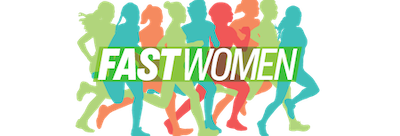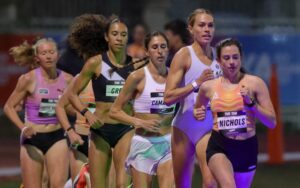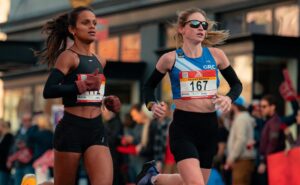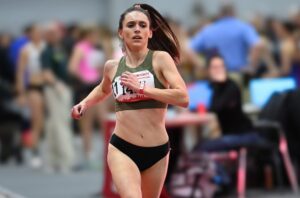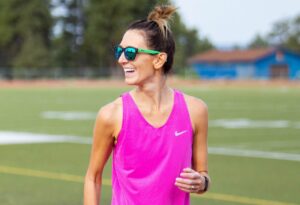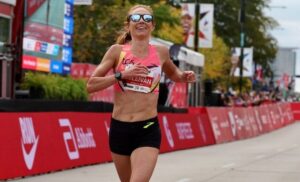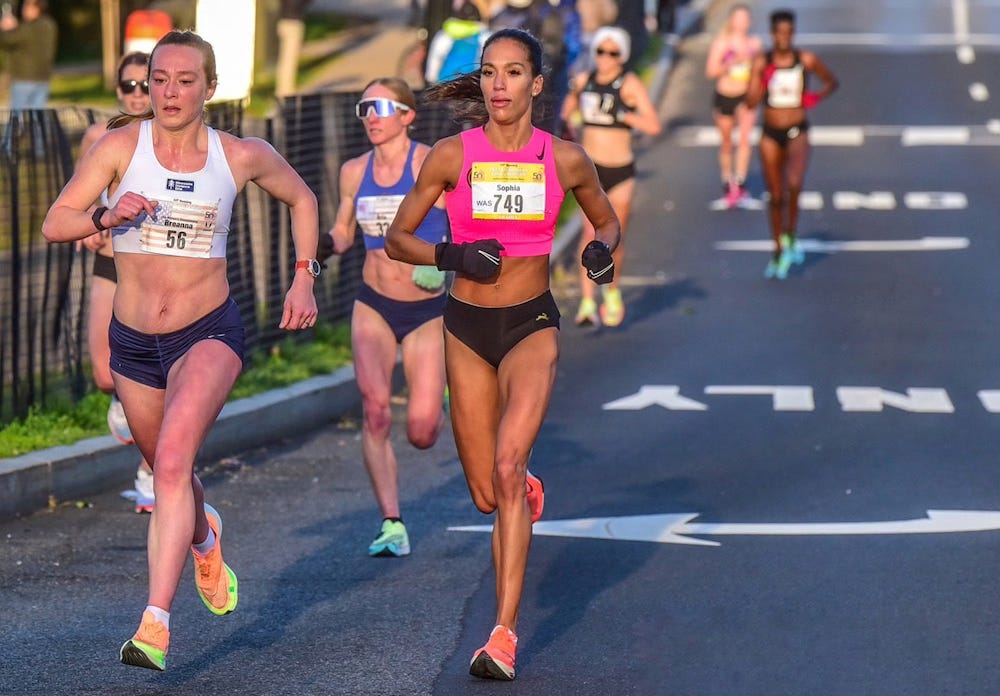
When Sophie King took up distance running in 2021, she approached training like the former swimmer she is, going hard every day. “In swimming, we never had easy days, so I never considered [running] easy mileage,” King told Fast Women. “I was always trying to run under 7:00 pace, whether I was on a trail or whatever. I thought it was always supposed to be hard.”
King, 27, is a cancer researcher at the National Institutes of Health, and when her job went remote during the pandemic, she moved home to Chesterfield, Virginia, and became her father’s primary caretaker as well.
“He unfortunately isn’t able to walk much these days, but every day, he gets up and he says he’s gonna run a marathon today,” she said. “Hearing him say that, I just told him, ‘Maybe I’ll run one for you,’ thinking it would just be one.”
King began training for the 2021 Richmond Marathon, held in November. She had run distance races before and showed a lot of promise, but she still had a lot to learn when it came to training. Fortunately, her sister Bethany, an experienced runner, explained the concept of recovery days to her around that time. In order to figure out how to train for a marathon, King went on Strava and noticed that people were doing a couple of workouts a week, long runs, and increasing their mileage over time.
But she must have been following some pretty serious runners, because she jumped right into running 60–75 miles per week. Fortunately, her body held up. In her debut marathon, despite knowing very little about fueling on the run, she finished third among the women in 2:49:02. After going through halfway in 1:26:05, King ran the second half in 1:22:57. Most important, she fell in love with running.
After the race, someone told her she wasn’t all that far off of the qualifying time for the 2020 U.S Olympic Marathon Trials, 2:45:00. “I had no idea what was fast and what was not, which is good and bad, because you don’t limit yourself,” King said. “But at the same time, you don’t really know where you are in the scheme of the running scene.”
She decided she would go after a qualifying time for the 2024 U.S. Olympic Marathon Trials. And when the qualifying time dropped to 2:37:00 shortly thereafter, King wasn’t fazed. She hired an online coach to help her. In her second marathon, the 2022 Grandma’s Marathon, she still didn’t quite have fueling down. She took water along the course and two gels, and improved to a 2:41:58.
By the time the California International Marathon rolled around in December 2022, she had figured out how to fuel. And only 15 months after she decided to train for her first marathon and take the sport more seriously, she qualified for the 2024 U.S. Olympic Marathon Trials, running 2:35:47.
King says her father doesn’t quite understand how good she is, but he’s proud nonetheless. “Something I wanted to do for him ended up being something that saved me and something that I do for me now,” she said. “Every day, he’ll say, ‘I’m so proud of you for taking your health so seriously.’ My dream is for him to one day watch me race. He just hasn’t been healthy enough to get out of the house for that long.”
Swimming to stand out
In some ways, it’s no surprise that King is having success in running now. She grew up in a family of runners, but as a quadruplet, she wanted to forge her own path. Her brother and two sisters all ran in high school, which made her more determined to find success in swimming. “I had my own set of friends, my own sport, and my own attention from my parents because of swimming, so I really clung to it,” she said.
The track coach at Matoaca High School knew King might be good at running, and her swimming coach let her out of practice one day a week during track season so she could run in some track meets. She did no running-specific training, and she thinks the longest she ever ran in high school matched the distance of her longest race: 1000 meters. But off of swimming training, King thinks she ran about 2:18 for 800m and 3:03 in the 1000m. She earned all-state honors in the latter event her senior year, the same weekend she competed in regionals for swimming.
Being a quadruplet inspired King to give her best in everything she did. “When I look back, I had my own set of teammates all the time, but I also had my biggest competitors,” she said. “Being in that kind of environment where you just continually push yourself and each other, it created this incredible foundation as an athlete and just as a person in general. And all of them would say the same, I’m sure.”
King walked on to the swim team at UConn and eventually earned a scholarship, but beginning her junior year, illness prevented her from reaching her full potential. She graduated in 2018 feeling like she had some unfinished business athletically. She attended Georgetown for graduate school, earning her master’s degree in public health, and then the pandemic hit, and she returned home to Virginia.
Mentored by the best
Thanks to a series of fortunate events—running the same races, winding up on the same flight on one occasion, and bumping into her at the local track—King got to know Virginia’s most famous runner, American record holder Keira D’Amato, and her coach, Scott Raczko.
When D’Amato introduced Raczko and King at the track, they chatted for a long time, and Raczko stayed to watch King’s workout. “I don’t think he knows this to this day, but that was the first time a coach had ever seen me run [a workout] in person,” King said.
King appreciated that Raczko didn’t seem shocked by her goals. It wasn’t long before Raczko offered to coach her, and she jumped at the chance. “It’s been the best, most life-changing thing that’s happened in my running career so far,” King said.”
Now King meets up with D’Amato and Raczko at least twice a week. She and D’Amato either do the same workouts, or they do different workouts alongside one another. If King is keeping up with D’Amato, it’s usually because they’re doing 200s or King is doing a shorter version of D’Amato’s workout. (For instance, at a recent workout, King did 1200s while D’Amato did miles.)
“If she’s about to drop me, she’s always giving me praise,” King said. “For her to skip a breath so that she can give me those words is just the kindest thing.” King also appreciates that D’Amato has been quick to introduce her to as many people as possible in the running industry, because D’Amato remembers what it was like to feel like an outsider on the pro scene.
King’s buildup for the Olympic Trials, which take place February 3, 2024 in Orlando, Florida, is already underway. She plans to race the Richmond Half in November, but her main goal is a top 15 finish at the Trials. Her running has been going so well that she has decided to put her plans to attend medical school on hold for now.
“I really do believe that I could be something great in this sport, and I don’t want to leave it prematurely,” she said. “I think I would always wonder where I could go with it. This is a more pressing passion and I want to see it through.”

